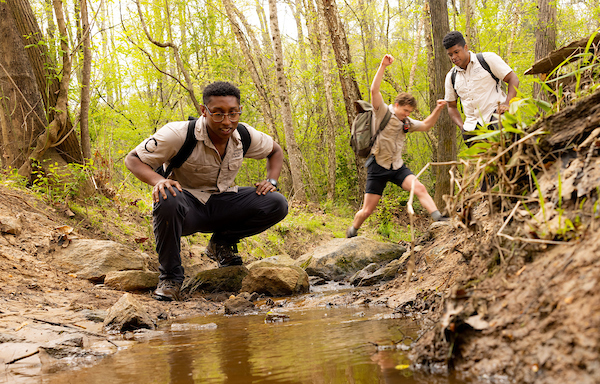Environmental Science
Learn More about Environmental Science
Admission Requirements
None.
This program does not have specific admission requirements. Only admission to Kennesaw State University is required to declare this major.
General Education Core IMPACTS Curriculum Recommendations for this Major
M: Students should take MATH 1113 or higher.
T: Students should take MATH 1179 or higher.
T: Select two course pairs from the following (8 Credit Hours): CHEM 1211/L, CHEM 1212/L, PHYS 1111/L*, PHYS 1112/L, PHYS 2211/L*, PHYS 2212/L, BIOL 1107/L, or BIOL 1108/L *Students cannot take both PHYS 1111/L and PHYS 2211/L nor PHYS 1112/L and PHYS 2212/L.
Related Minors or Certificates Available
- Biology Minor
- Environmental Science Minor
- Environmental Studies Minor
Sample Classes
-
ENVS 3100K: Soil & Water Science
This course will provide an overview of soil and water science including study of the physical, chemical and biological properties of each and how these properties relate to soil health and water quality. Students will consider human activities that impact soil and water resources, learn how to assess those impacts and apply management approaches towards them. Laboratory exercises will involve the application of techniques for monitoring soil and water quality and methods for remediation.
-
ENVS 3350: Oceanography
Students in this course will learn how plate tectonics affect the positioning of our continents, how the physical and chemical makeup of seawater affects the ocean’s properties, and how air-sea interactions, ocean circulation, waves and tides all affect our climate. Finally, students will explore the biological richness of the ocean ecosystem by studying coastal habitats, biological productivity, pelagic and benthic marine organisms, marine pollution and the exploitation of marine resources.
-
ENVS 3450: Conservation Biology
This course will cover fundamental principles of conservation biology. Students will learn about the history and development of the conservation movement, learn how to examine human impacts on plants and wildlife, delve into interaction of conservation and society, and determine how to manage and conserve endangered species. Class exercises will cover quantitative techniques used to evaluate and predict the status of plant and animal populations and ecological methods for monitoring and maintaining biodiversity in ecosystems.
-
ENVS 4000K: Wetlands and Mitigation
This course covers wetlands as components of natural landscapes. Students will learn to characterize the biogeochemistry, hydrology, geomorphology, and soil properties of wetlands. Students will learn how to classify wetlands by considering soil and hydrologic factors important to wetland delineation and jurisdictional determination. Finally, students will learn how to mitigate impacts on wetlands with an emphasis on wetland restoration and creation.












